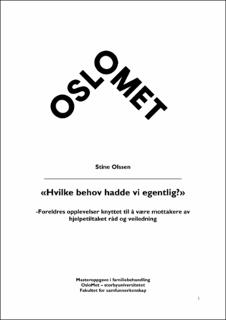"Hvilke behov hadde vi egentlig?" - Foreldres opplevelser knyttet til å være mottakere av hjelpetiltaket råd og veiledning
Master thesis
Published version
Permanent lenke
https://hdl.handle.net/11250/2823859Utgivelsesdato
2021Metadata
Vis full innførselSamlinger
Sammendrag
Familieveiledere i barneverntjenesten jobber ut ifra et systemisk perspektiv, noe som kan skape et dilemma med de normative føringene barnevernets mandat har. På bakgrunn av dette ble jeg nysgjerrig på hvilke opplevelser foreldrene sitter igjen med etter å ha mottatt hjelpetiltak fra barneverntjenesten. Formålet med dette masterprosjektet er å belyse foreldres opplevelser som mottakere av frivillig hjelpetiltak. Ved å løfte frem hvilke opplevelser knyttet til tiltaket foreldre er opptatt av, håper jeg å skape refleksjon som kan bidra til erfaringsbasert kunnskap inn til praksisfeltet. Min problemstilling for prosjektet var «Hvilke opplevelser og behov forteller foreldre om knyttet til hjelpetiltak i regi av barneverntjenesten?»
Studien har et kvalitativt design, med semi-strukturert intervju som datainnsamlingsmetode. Utvalget består av fire foreldre som har mottatt frivillig hjelpetiltak råd og veiledning. Datainnsamlingen er tematisk analysert, og drøftet med utgangspunkt i systemteori, domeneteori, og ulike aspekter ved makt i en barnevernkontekst.
Hovedfunnene fra dette prosjektet peker på foreldrenes behov for å bli inkludert i målsettingen for endringsarbeidet og evalueringer underveis. Foreldrene som opplevde å bli likestilt med veilederen under oppstarten og målsettingen for samarbeidet uttrykte større positiv opplevelse med tiltaket. Videre var alle foreldrene enige om behovet for å få løftet frem de gode intensjonene og bygge endringsarbeidet på ressursene hos familien. Ved å få utvidet forståelse for hverandre gjennom å fokusere på de gode intensjonene i samtaler, opplevde foreldrene at relasjonene innad i familien ble styrket.
Det siste hovedfunnet peker på foreldrenes oppfattelse av seg selv som familie i en barnevernkontekst. Flertallet av informantene distanserte seg fra begrep som «typisk barnevernsfamilie», og uttrykte behov for anerkjennelse fra veilederen på at de var gode nok foreldre til å fortsette endringsarbeidet etter endt tiltak. Family therapists is working from systematic perspective, that can create a dilemma with the normative guidelines in child welfare services. With this as background I was curious of what kind of experiences the parents are left with after receiving remedial action from child welfare services. The purpose of this study is to illuminate the parents experience as receivers of volunteer remedial action. By pointing out the parents’ experiences related to the assistance from child welfare service, I hope to contribute to reflection in the field of practice. The thesis is as following: What experiences and needs do the parents talk about after received volunteer assistance from the child welfare service?
This study has a qualitative design, with a semi-structured interview as a data collection method. Four parents who has received the volunteer assistance advice and guidance were interviewed. The data collection is analyzed thematically, in the light of systemic theory, domain theory and different aspects of power in a child welfare context.
The analyses from this study pointing at parents needs to be included in the objective of the change work, and in the evaluations along the way. The parents who experience to be equal with the therapist in the beginning, and included in the goal of the collaboration, expressed a greater positive experience with the assistance. Was more satisfied with the help from Child Welfare Service. All the parents were agreed in the need of highlighting the good intentions and focus on the resources of the family. By gaining an expanded understanding of each other through highlighting the good intentions in dialog, the parents experience that the relationships in the family were strengthened. The last main find int this study is pointing at the families’ perceptions of themselves in the context of child welfare service. The majority of the parents expressed a need to distance themselves from det concept “the typically family of child welfare services”. They also expressed a need for recognition from the therapist that their parents’ practices were “good enough” when they should continue the change work after the assistance from det child welfare service.
